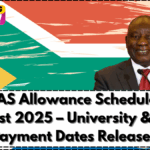As of July 2025, the National Student Financial Aid Scheme (NSFAS) has implemented a revised structure for its NSFAS accommodation allowance 2025, reshaping how student housing expenses are handled across the country. The update comes amid continued feedback from students and institutions highlighting the rising cost of living and accommodation.
The new model increases monthly rent caps for students in metropolitan and high-density urban zones, aiming to better align with real-world rental prices. Students at public universities and TVET colleges will see differentiated support levels depending on the region and type of accommodation. For many, this update offers significant relief, particularly in provinces like Gauteng and Western Cape, where rental prices have consistently outpaced previous bursary provisions.

Regional Adjustment of Student Rent Support
NSFAS has now introduced a tiered model to determine student rent support based on geographic zones. Urban centers with high rental rates will receive a higher cap, while semi-urban and rural areas have slightly lower ceilings. This change recognizes the discrepancy in rental costs between locations and ensures fairness without overfunding.
Here’s a look at the updated monthly accommodation allowance figures effective July 2025:
| Region Type | Max Monthly Allowance | Type of Housing |
|---|---|---|
| Urban (High-cost) | R5,000 | Private or Institutional |
| Semi-Urban | R3,800 | Private or Institutional |
| Rural | R2,900 | Private or Institutional |
| Campus Residence | Fully covered | On-campus housing |
These changes offer more precise alignment with actual rental demands, improving accessibility for students who previously struggled to secure safe, affordable housing.
New Accountability Measures for Accommodation Providers
In tandem with the allowance revision, NSFAS introduced a verification system for private housing providers. Under the 2025 update, landlords must register with NSFAS and meet specified standards before being eligible to house funded students. This initiative ensures the bursary update delivers value and that students are placed in safe, habitable environments.
Institutions have also been directed to monitor and validate housing arrangements to prevent fraud and double claims. NSFAS aims to maintain transparency while eliminating loopholes that led to misuse in prior years. This means better monitoring but also more assurance that each rand is truly supporting student well-being.
Impact on Students: What This Means Going Forward
The revised NSFAS accommodation allowance 2025 is a decisive step toward easing the financial pressures students face while pursuing higher education. For many, this means no longer needing to top up their housing expenses from personal or family resources, allowing them to focus more on their studies.
Additionally, the separation of support by region acknowledges South Africa’s diverse cost-of-living landscape, which had long been a blind spot in previous funding models. More equitable distribution fosters retention and success among disadvantaged students, particularly in provinces previously under-supported.
How Institutions Are Responding to the 2025 Bursary Update
Universities and TVET colleges have broadly welcomed the changes. Several institutions are now developing partnerships with vetted accommodation providers to streamline the process and ensure that more students can be housed safely and affordably.
A number of campuses are expanding their residence programs or investing in mixed-use housing solutions. With the updated allowance making private accommodation more viable, some are also considering long-term leases with private developers as part of their housing strategy.
FAQ – NSFAS Accommodation Allowance 2025
What is the new maximum monthly NSFAS accommodation allowance in July 2025?
The updated cap varies by region. Urban students can receive up to R5,000 monthly, while those in rural areas may receive up to R2,900. Campus housing remains fully covered.
Are students in TVET colleges eligible for the same housing support?
Yes, both university and TVET students are included in the updated structure, with allowances adjusted to their location and housing type.
How does NSFAS verify private accommodation in 2025?
Landlords must be registered and meet NSFAS quality standards. Institutions must also validate and monitor student accommodation arrangements.
Can students use the allowance for shared housing?
Yes, shared accommodation is allowed as long as it meets the registered and approved standards set by NSFAS.
Will the housing allowance be adjusted again later in 2025?
NSFAS has stated it will review the allowance structure periodically. Further adjustments may be announced depending on inflation and rental trends.
Click here to learn more
Akesh is a talented content writer known for creating captivating and impactful narratives. He understands what resonates with audiences and tailors his content to inform, inspire, and engage. From blog posts and articles to marketing copy, his work consistently combines creativity with clarity. His skillful writing strengthens our brand’s voice and ensures our message leaves a meaningful impression.



